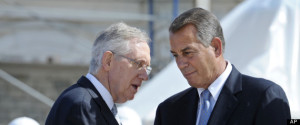‘Fiscal Cliff’ talks still uncertain.
 It’s less than a month before the ‘fiscal cliff’ but the White House and the Congress are yet to reach a common ground.
It’s less than a month before the ‘fiscal cliff’ but the White House and the Congress are yet to reach a common ground.
Last week, the White House delivered a $1.6 trillion proposal that presses for higher federal tax rates on higher income tax brackets- as well as the power for the President to raise the national debt limit- in an effort to tame the effects of the impending year-end fiscal disaster. Republicans were quick to counter the White House plan with their version of ‘fiscal cliff’ proposal submitted to the Congress on Monday. Republicans strongly oppose federal tax rate increase, and instead aims to avert the effects of tax cut expirations and automatic federal tax rate increases by curbing federal spending on benefit programs such as Medicare and Medicaid.
White House and Republican point persons have been busily running around this week- appearing on interviews to reiterate why or why not federal taxes should increase- but there is still very little progress in the negotiations. Based on the current pace of negotiations, an understanding may not be reached until the day before the ‘fiscal cliff.’
The ‘fiscal cliff’ is the term used to refer to the fiscal crisis to be faced by the US government by the end of 2012 due to the concurrent expiration of federal unemployment benefits and the Bush federal tax cuts, as well as the commencement of the Budget Control Act of 2011. Federal tax rates for payrolls will rise from 4.2 to 6.2 percent and taxpayers will have to pay additional federal taxes for Medicare.

